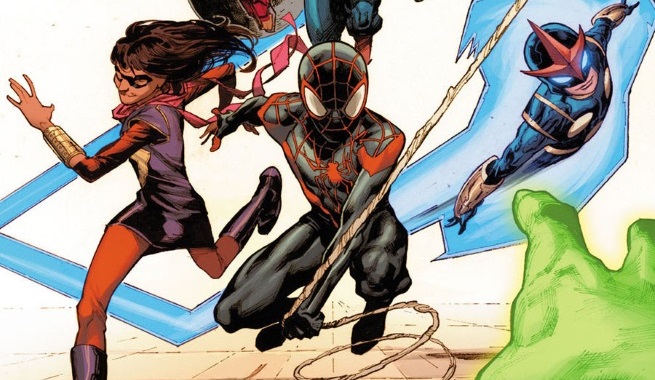Marvel VP Said Sales Slumped Because “People Didn’t Want Any More Diversity”
"They didn't want female characters out there."


This one’s not an April Fools’ joke, dear readers.
In an interview at the Marvel Retailers Summit, reflected on the company’s sharp sales downturn since October. While he cited a number of factors–the economy, Marvel’s too-many titles, general consumer unease due to the Nov. 8 apocalypse–he also pointed to readers’ changing tastes. “There was definitely a sort of nose-turning,” he said, “at the things that we had been doing successfully for the past three years, no longer viable.”
Asked what specifically changed, he gave this oh-so-executive answer:
“What we heard was that people didn’t want any more diversity. They didn’t want female characters out there. That’s what we heard, whether we believe that or not. I don’t know that that’s really true, but that’s what we saw in sales.
We saw the sales of any character that was diverse, any character that was new, our female characters, anything that was not a core Marvel character, people were turning their nose up against. That was difficult for us because we had a lot of fresh, new, exciting ideas that we were trying to get out and nothing new really worked.”
Gabriel’s quote is representative of a constant, recurring problem for media which features marginalized protagonists. When confronted with sales drops for diverse characters, executives blame the diversity. Time to cancel those series! When sales for “traditional” (read: white, male) characters drop? Instead, it’s time to change up the creative teams, look at the storylines, and bump those ad dollars!
This discrepancy is infuriating, and it creates constant, unfair pressure around representation in media. Creators end up bearing the burden of an entire demographic. The only Latinx superheroine has to succeed; otherwise, they won’t make any others. The one all-women comedy has to absolutely smash the box office; otherwise, they won’t make any others. Meanwhile, eighteen different Bourne or Superman ripoffs can repeatedly fail, and repeatedly be produced, with no one threatening not to make any more.
Gabriel later clarified his statements after some serious backlash.
“Discussed candidly by some of the retailers at the summit, we heard that some were not happy with the false abandonment of the core Marvel heroes and, contrary to what some said about characters “not working,” the sticking factor and popularity for a majority of these new titles and characters like Squirrel Girl, Ms. Marvel, The Mighty Thor, Spider-Gwen, Miles Morales, and Moon Girl, continue to prove that our fans and retailers ARE excited about these new heroes. And let me be clear, our new heroes are not going anywhere! We are proud and excited to keep introducing unique characters that reflect new voices and new experiences into the Marvel Universe and pair them with our iconic heroes.
We have also been hearing from stores that welcome and champion our new characters and titles and want more! They’ve invigorated their own customer base and helped them grow their stores because of it. So we’re getting both sides of the story and the only upcoming change we’re making is to ensure we don’t lose focus of our core heroes.”
As io9 points out, Marvel certainly does have some problems with their editorial model. They launched 12 different events and crossovers in the past two years, increased the cost of single issues, pumped out new titles, and frequently shuffled artists and writers from book-to-book. These moves and changes exhaust fans–and their wallets–and they’re certainly more likely to affect new titles than old. Plus, fans are less likely to invest in a title when they suspect that Marvel itself isn’t even that invested.
But instead, I guess, let’s chalk the problem up to “too much diversity.” Ugh.
(Via ICv2 and io9; image via Marvel Comics)
Want more stories like this? Become a subscriber and support the site!
—The Mary Sue has a strict comment policy that forbids, but is not limited to, personal insults toward anyone, hate speech, and trolling.—
Follow The Mary Sue on Twitter, Facebook, Tumblr, Pinterest, & Google+.
Have a tip we should know? [email protected]